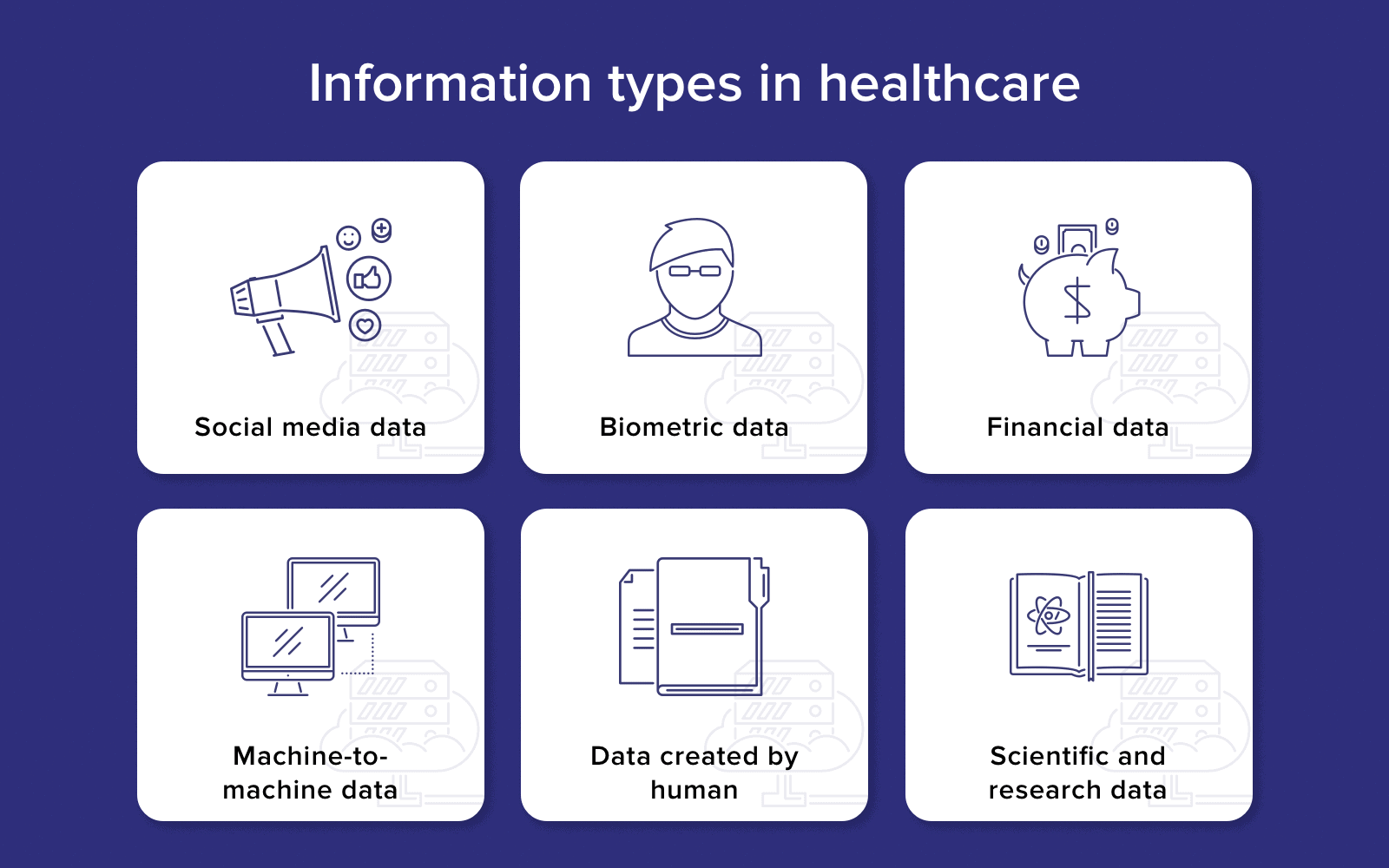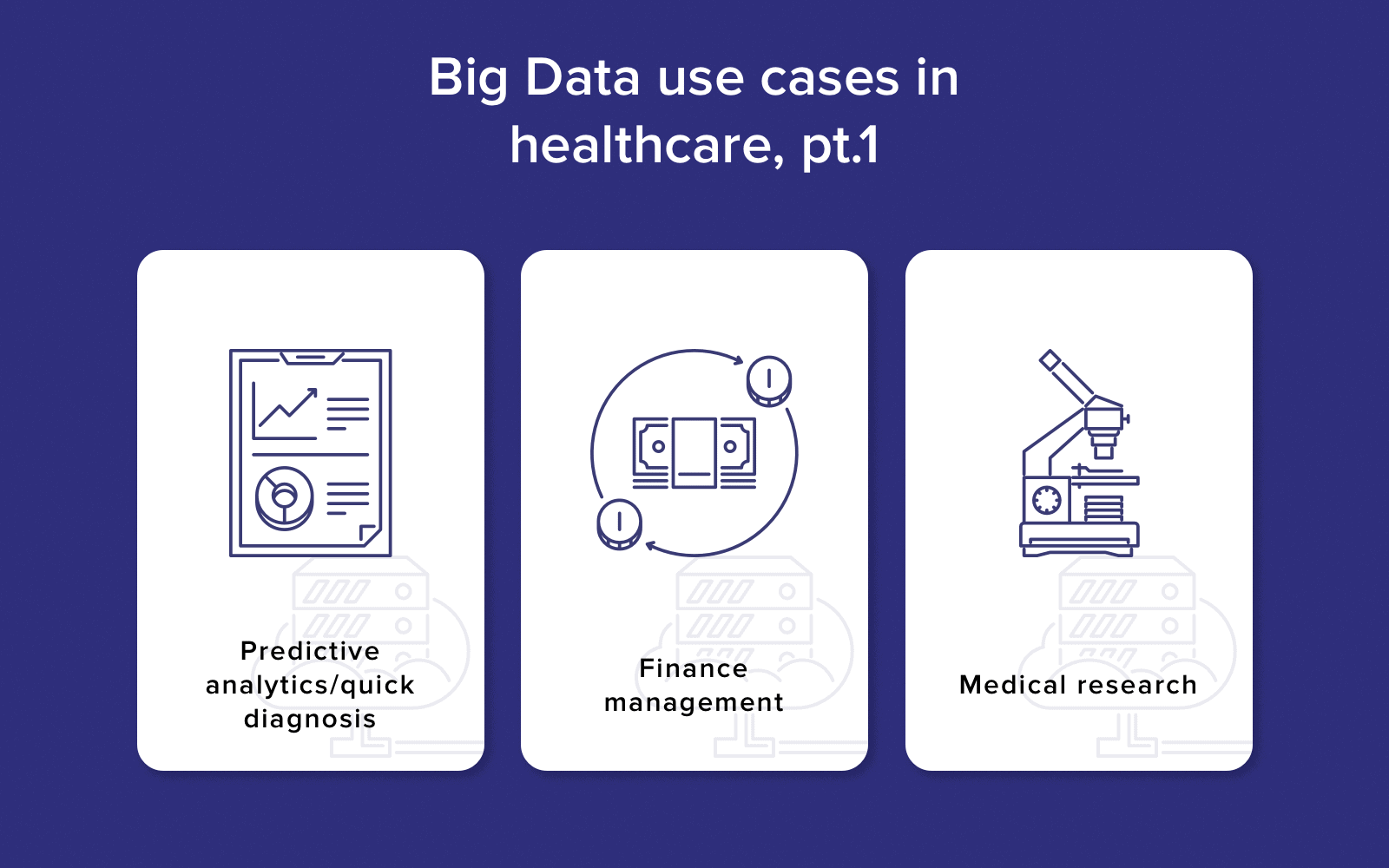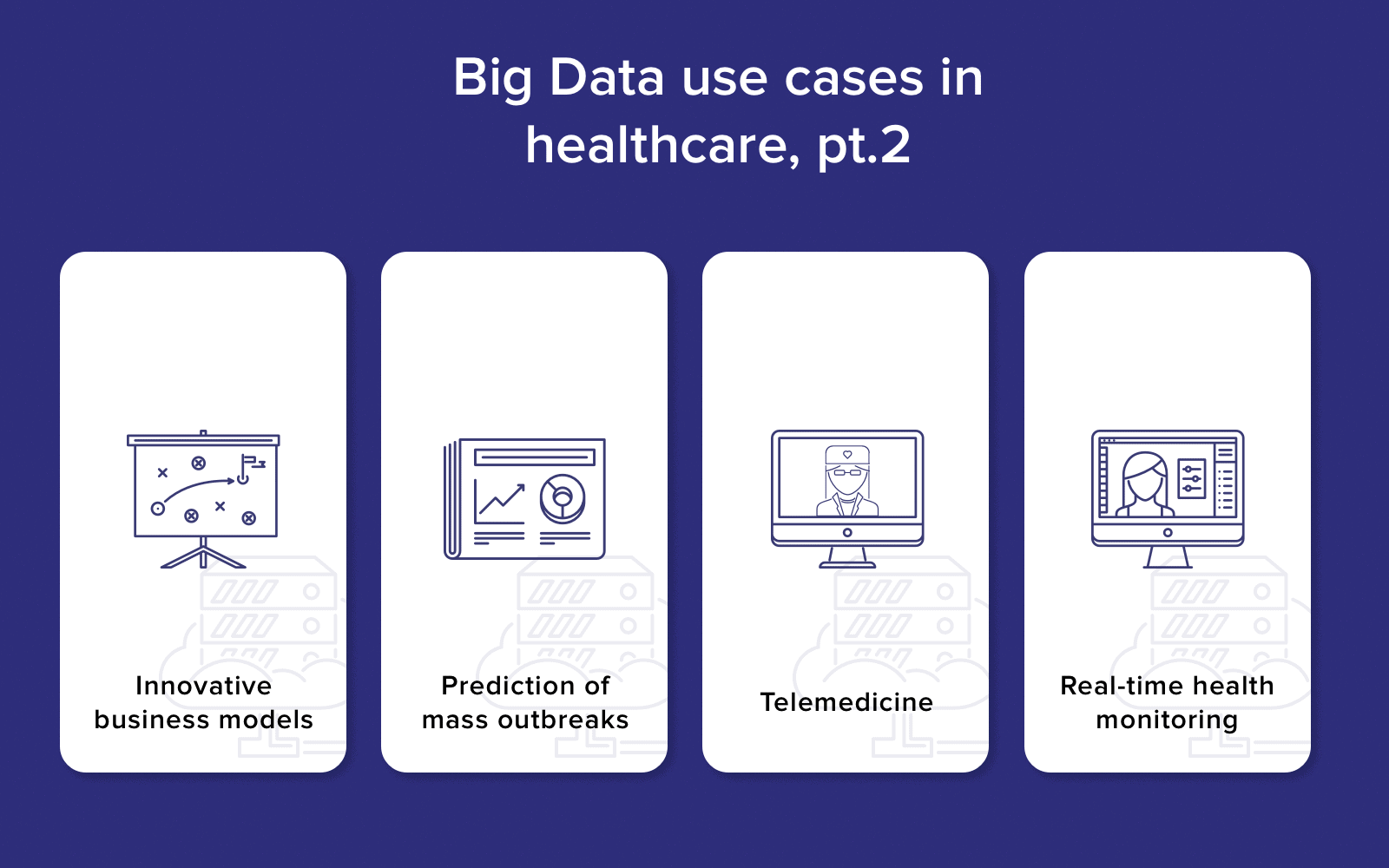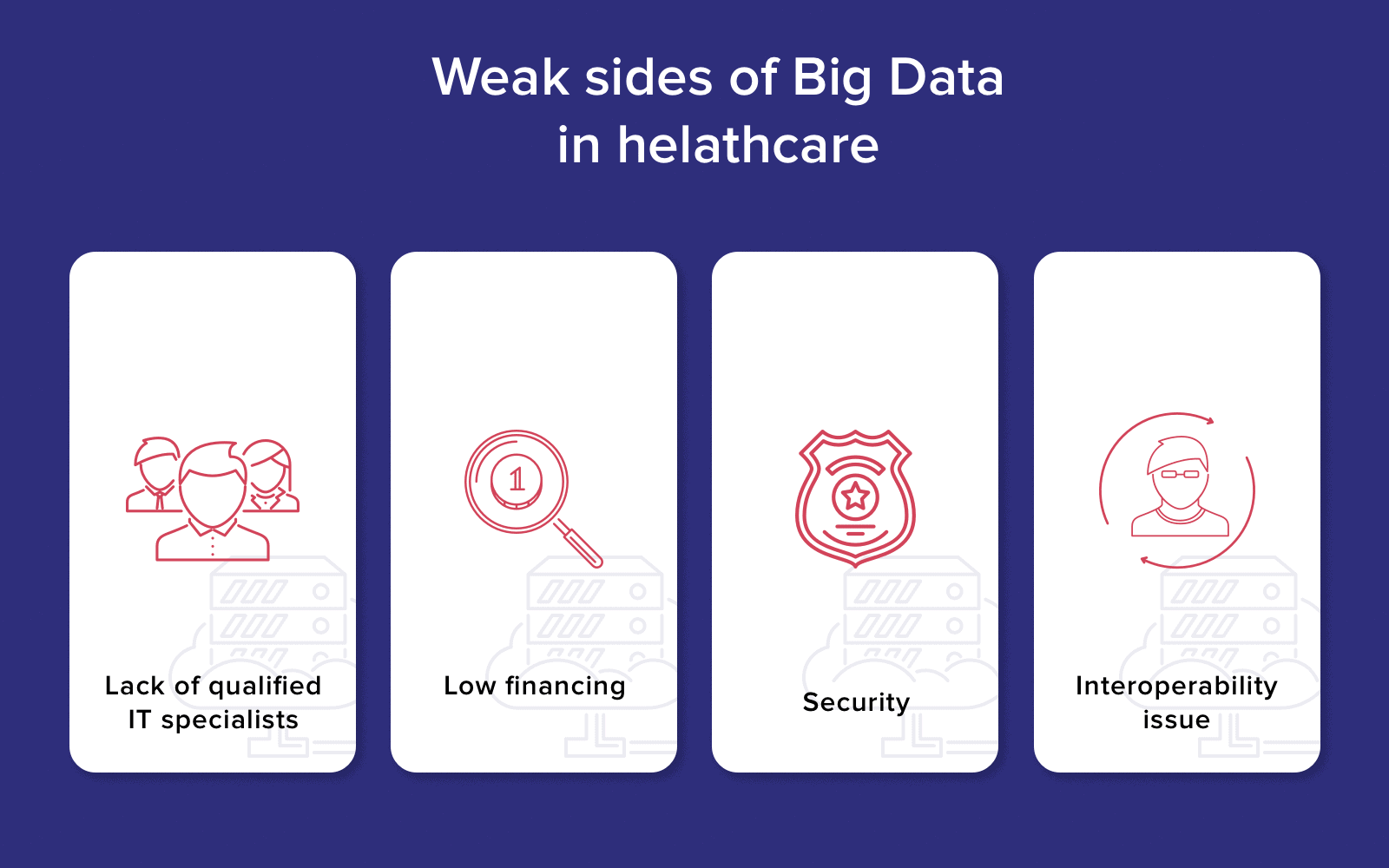The healthcare industry historically has produced a great amount of information. While a lot of data is still stored in hard copy form, the current trend of massive digitization is going to improve this. There is a necessity to improve the quality of medical services and, at the same time, reduce the price. Big Data promises to perform a lot of medical and healthcare functions.
As we can see, Big Data has had a great impact on our lives. We are able to see changes in many industries. Healthcare is one of the most promising fields where Big Data is applied. It is obvious that this trend in technology constantly increases benefits and reduces prices. The latest technology helps with patient access and the patient’s experience with their healthcare provider. Moreover, it is solving a lot of global troubles the mankind is faced with.
As the world population is growing, the development of predictive analytics is significant to foresee epidemics, improve treatment methods, etc. Using Big Data correctly can give an opportunity to avoid some diseases and improve the quality of life. Health professionals are able to store a lot of significant information.
So, let’s discuss 7 ways of using Big Data analytics in the healthcare field.
Why is Big Data a breakthrough for healthcare?
Big Data technology in the healthcare field creates a lot of positive and life-saving outcomes. Big Data in medicine should be processed. Speaking about medicine we are able to claim that the data processing is vital because any mistake or failure can literally cost somebody’s life.
There are 6 types of information in the healthcare field:

- Social media data. It’s obvious that this type is connected with the collection of data from different healthcare apps and even personal profiles on Facebook or Twitter.
- Machine-to-machine data. The information is received from different wearable devices like fitness trackers, smartwatches, sensors, etc.
- Financial data. Payments that were done for healthcare services or any other papers related to financial processes are significant.
- Biometric data. Fingerprints, X-Rays images, MRI scans, etc.
- Data created by human. For example, your paper medical documents, medical cards, EMR (electronic medical records), etc.
- Scientific and research data. The analysis of new medicine, their influence on our body, negative effects, etc.
Nowadays, Big Data application in healthcare is based on the highly qualified and fast treatment process. For instance, healthcare reforms in the USA made human beings pay more attention to the efficiency of accomplished therapy. Big Data analysis and processing technologies allow doctors to get a salary or payment not for the care process but for their abilities to heal the clients’ diseases quickly and keep their health in good condition.
Moreover, using Big Data in the healthcare field provides an opportunity to predict the expenses. A huge amount of different statistical data like the number of people with chronic disease, complaints against specific doctors, the number of next visits, epidemic indices, and so on.
Healthcare specialists can use Big Data analysis in order to see the frequency of next visits, skipped appointments, the full time of surgery, if doctors have enough medical supplies, etc. Consequently, these processes are able to enlarge the number of surgeries and, at the same time, reduce the prices. Specialists may perform post-surgery treatment more quickly and, as a result, provide more patients with qualified help.
Consequently, all these improvements allow medical services providers to decrease the time of patients’ hospital stay or reduce the number of second hospitalizations.
Big Data analytics in the healthcare field consists of several types:
- Descriptive analytics
- Diagnostic analytics
- Predictive analytics
- Prescriptive analytics
As you can see, this is a kind of cycle that starts with the determination of the problem to the solutions on how to avoid these troubles in the future.
Now, it is high time to look through the methods of using Big Data analysis in the healthcare field more precisely.
Big Data use cases in healthcare
Of course, there are a lot of ways of using Big Data in healthcare. Let’s discuss the most common of them.

Predictive analytics and quick diagnosis
Experts from CSS Insight have claimed that the cost of wearable devices is able to become $25 billion by the end of 2019. Nowadays people utilize such devices as fitness trackers and smartwatches to collect and analyze information about their heart rhythm and physical activity. Moreover, there is an opportunity for the clients to send all collected data directly to their family doctor.
This is vital for the prediction of inherited diseases. For instance, the patients at risk of developing a specific disease (e.g. diabetes) can benefit from preventive care.
Even if a person doesn’t have any health-related problems, it’s important to collect information. As a result, this process is able to help doctors or medical specialists create flexible databases. After that, a computer with artificial experience may make suggestions for each patient according to the information collected from other human beings.
So, artificial intelligence is very helpful. The analysis of information collected by trackers by neural networks allows patients to figure out the disease. As a result, they can take in-time measures to predict and prevent it. Now using Big Data doctors are able to predict the results of their treatment, considering what kind of lifestyle the patient leads.
Finance management
Machine learning can help us analyze bills and funds. As a result, we are given an opportunity to reduce the number of mistakes and embezzlements. Considering patients’ financial abilities and their demand in service Big Data allows forming price plans. As a result, Big Data is able to provide positive changes in the healthcare field. Moreover, these systems are able to bring positive modifications to a habitual payment system. So, the clients will be provided with an opportunity to pay for the quality of medical assistance. One more benefit is a chance to manage expenses for medicine and labor of hospital stuff.
Medical research operations
It is obvious that this part is about predictive modeling in the development of new remedies. Big Data tools and statistical algorithms are able to manage clinical trials. So, it’s easier to recruit people to test new drugs and find better match treatments to individual patients. By the way, this technology allows reducing trial failures and speeding new treatments to market. Analyzing clinical trials and patients records give an opportunity to discover adverse effects before drugs reach the market. Moreover, there is the application that is able to process the results and, according to them, do the medicine rank more personalized.
As a result, doctors are able to prescribe new drugs and treatment methods. By the way, these procedures in the segregation of disease patterns help specialists distinguish risks.

Innovative business models
Of course, Big data in healthcare can bring you profit for the business. Data aggregators are able to give third parties analyzed and assembled data blocks. There are some ideas. For instance, if a pharmaceutical company wants to see or use clinical records of the people that took a certain drug, it may be possible to purchase this information.
Prediction of mass outbreaks
Big Data allows scientists to build social models of population health. According to them, doctors can create predictive models of outbreaks progress. These algorithms are able to analyze disease outbreaks. As a result, doctors are given an opportunity to create more accurately targeted vaccines faster.
Turning a great amount of information into actionable information allows utilizing data to identify needs, provide services, and predict and prevent crises. It’s a wonderful benefit for the population of our world.
According to the Forbes article, there are four hospitals in Paris that have been using Big Data algorithms to how many patients are expected to be at each hospital daily and hourly. As a result, it is possible to count how many specialists are necessary to work.
Telemedicine
The evolution of online video conferences, smartphones, wireless devices, and wearables gives telemedicine an opportunity to provide patients with medical services on distance. Nowadays healthcare technologies are able not only to give a primary diagnosis but also to consult patients and monitor their health. Sometimes it is even possible to use telesurgery. As a result, doctors can lead operations using robots and high-speed real-time information delivery, but they are not near the patients during the surgery.
Doctors often use telemedicine to prevent hospitalization and readmission. Moreover, telemedicine is able to decrease the expenses because it can be unnecessary to visit the specialist in order to create a personalized treatment. Patients are able to avoid lines and doctors don’t need to waste time filling documents and giving unnecessary consultations.
Real-time health monitoring
Returning to the wearable devices like fitness trackers and wristbands, it is important to underline their ability to monitor the health of their users in a real-time mode and provide doctors with information and changes. So, data from all sensors can be analyzed instantly and, if something is wrong, an alert will be automatically sent to the doctor or another specialist. As a result, the doctor is able to contact the patient without further delay and give them all the necessary instructions.
So, as you can see the healthcare field and Big Data can bring a lot of benefits to each other. On the other hand, it is important to remember that Big Data requires not only hardware but also appropriate software that will be able to provide good functionality. That’s why creating a medical app needs experience in working with Big Data solutions.
Problems with Big Data in healthcare
Of course, if you have decided to work with Big Data technologies, you need to know everything about possible factors that can bring some negative influence. So, it is high time to discuss the reasons that cause problems:

- Lack of qualified IT specialists. Specialists that are able to combine managing software and controlling IT support in clinics are quite rare. Of course, talented doctors are vital, but taking into consideration the fact that Big Data is constantly growing, IT specialists are becoming more and more significant. That’s why it’s necessary to fill this gap in the healthcare field.
- Low financing. Healthcare data solutions face the problem of financial limitations. So, the government doesn’t give enough money for the implementation of Big Data development in healthcare.
- Security. Nobody will debate that this is one of the most important issues. Personal information is extremely valuable, so it is obvious that the personal medical data or EHRs (Electronic Health Records) should not be open to third parties. Some studies have shown that in the medical field the data breaches happen quite often. Of course, every information breach may have dramatical consequences. Moreover, to start working with Big Data, doctors or other specialists should have access. It is obvious that providing a few specialists with this access doesn’t cause harm, but what about the big group of specialists? So, there is a problem. To solve this problem efficiently, it’s important to choose good and experienced Big Data vendors that are able to supply secure and well-supported distribution.
- Challenge of interoperability. There are still some factors that don’t allow a lot of healthcare systems to cooperate. It’s high time to discuss some of them:
- No specific standards because all of them depend on providers and regions
- Discrepancies in privacy laws. Different states have discrepancies in their laws. That means providers should worry about the security while they exchange personal medical data
- Old school approach. As strange as it sounds but some healthcare providers still utilize paper health records despite the great development of digital technologies. Of course, it is necessary for these documents to be digitized.
- Semantic challenge. Healthcare applications and systems may use different terminology that can create incompatibility between the systems.
So, we have provided you with seven Big Data use cases in the healthcare field. As a result, it is possible to highlight three main trends in this area:
- The experience of visiting doctors improves, as well as the quality of treatment. So, the patients are able to be more satisfied
- The population’s health will be better over time
- The expenses on medical services will reduce
The medical industry is constantly changing and Big Data provides a lot of improvements, but there is still a lot of work to do. Big Data in the medical field has a lot of advantages that can help make better-informed decisions, improve operations, etc. Even today doctors use Big Data for early identification of illnesses, diseases or, what is even more significant, prediction of some health-related problems. I am sure that nobody will deny that prevention is much better than treatment. So if you are ready to tackle some troubles while using Big Data in healthcare, it’s important to decide what kind of approach you will be using.
from Health Care Technology – ReferralMD http://bit.ly/2GmVol1
via IFTTT

No comments: